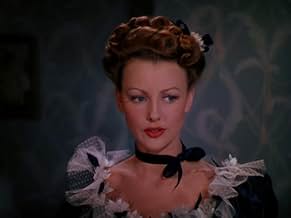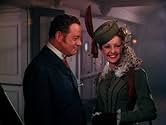IMDb RATING
6.3/10
361
YOUR RATING
Madeleine Marlowe, engaged to the Duke of Trippingham, discovers she's exposed as Rosie O'Grady by Police Gazette hack Samuel A. McGee, leading to an Irish brawl in her stage show.Madeleine Marlowe, engaged to the Duke of Trippingham, discovers she's exposed as Rosie O'Grady by Police Gazette hack Samuel A. McGee, leading to an Irish brawl in her stage show.Madeleine Marlowe, engaged to the Duke of Trippingham, discovers she's exposed as Rosie O'Grady by Police Gazette hack Samuel A. McGee, leading to an Irish brawl in her stage show.
- Awards
- 1 win total
Charles Trowbridge
- Husband
- (scenes deleted)
Bea Allen
- Chorus Girl
- (uncredited)
Louise Allen
- Chorus Girl
- (uncredited)
Herbert Ashley
- Minor Role
- (uncredited)
Hooper Atchley
- Salesman
- (uncredited)
Walter Baldwin
- Mailman
- (uncredited)
Featured reviews
Awesome vehicle for Betty Grable and Robert Young. Filmed in bright technicolor, it was the quality type of musical that MGM could seldom pull off. This film is rarely seen today and gets no breaks because it was a 20th Century Fox property, instead of being in endless repetitive repeats as the MGM lesser-quality films of the era are on TCM.
Regardless, when you get the chance, this is one to sit back and enjoy. Grable is magnificent and Young is surprisingly good. The music is outstanding.
Regardless, when you get the chance, this is one to sit back and enjoy. Grable is magnificent and Young is surprisingly good. The music is outstanding.
At 74 minutes, "Sweet Rosie O'Grady" is just long enough and does not wear out its welcome. But it is so good good-humored and good-natured that it is tough to dislike. It must have been a B musical when it came out and there is only one memorable song in the score, "My Heart Tells Me", sung by Betty Grable. The male lead, Robert Young, is a stranger to musicals but does, in fact, get to sing the title song - and was amazingly good.
The story is outlandish, about a saloon singer from Brooklyn who becomes an international sensation and returns, hopefully in triumph. Young is a reporter who spills the beans about her humble beginnings, and she vows revenge. From there they each try to outdo the other in revenge mode, and from here the plot goes far afield.
It is all harmless fun, and as bright and glossy as Fox could make it. The surprise, as noted above, is Young, who I didn't consider as either particularly funny or as a singer, but who proves he can be both here. Good support from Adolph Menjou and Reginald Gardner helps the cause. Leonard Maltin raved about Menjou in his review, and he gave a workmanlike but unspectacular performance. Makes you wonder if he ever sees any of these oldies he reviews.
The story is outlandish, about a saloon singer from Brooklyn who becomes an international sensation and returns, hopefully in triumph. Young is a reporter who spills the beans about her humble beginnings, and she vows revenge. From there they each try to outdo the other in revenge mode, and from here the plot goes far afield.
It is all harmless fun, and as bright and glossy as Fox could make it. The surprise, as noted above, is Young, who I didn't consider as either particularly funny or as a singer, but who proves he can be both here. Good support from Adolph Menjou and Reginald Gardner helps the cause. Leonard Maltin raved about Menjou in his review, and he gave a workmanlike but unspectacular performance. Makes you wonder if he ever sees any of these oldies he reviews.
Robert Young is perfectly cast as a wise-guy reporter writing for a pre-Enquirer rag called the Police Gazette who is assigned by his crusty Editor, played perfectly by Adolph Menjou (Walter Burns from the original Front Page), to write a series of expose-type articles on returning stage star Betty Grable's burlesque beginnings. The Technicolor is luscious throughout. Reginald Gardiner is a stitch, as usual, playing Betty's British betrothed who breaks off the engagement as a result of the scandal. Virginia Grey is perky and decorative as Grable's maid. Byron Folger also lends support as a perfectly prissy prig (what else?).
Betty, of course, is the star. She sings and dances with aplomb. The added delight is her comic timing and chemistry with Young. We enjoy and believe them at each others throats which makes the inevitable payoff in each others arms that much more enjoyable.
Betty, of course, is the star. She sings and dances with aplomb. The added delight is her comic timing and chemistry with Young. We enjoy and believe them at each others throats which makes the inevitable payoff in each others arms that much more enjoyable.
Newspaper reporter makes a name for himself by scandalizing in print a beloved showgirl, known abroad as "The Yankee Sensation". She counteracts by telling his rivals it's all a publicity stunt and that she and the reporter are actually in love. Musical remake by 20th Century-Fox of their 1937 hit "Love is News", which starred Loretta Young; this version, filmed in gloppy Technicolor, is just an excuse to show-off their latest find, Betty Grable, who has presence but no funny lines (and a dearth of memorable songs). As the reporter, Robert Young doesn't even have presence. Fox tried again with this story in 1948 under the title "That Wonderful Urge", starring Gene Tierney. Strictly for Grable-buffs. ** from ****
...."Sweet Rosie O'Grady" and "Mother Wore Tights" were Betty Grable's favorites of her films. It is easy to see why they are. "Sweet Rosie" is just possibly Betty at her peak. To give credit where credit is due, Betty's peak lasted a remarkably long time. In this Betty is an established star in England returning to the United States. Robert Young is a newspaper reporter who dredges up her less than glamorous beginnings as a singer in a beer garden. They then proceed to scrap and humiliate each other right through the whole film. Reginald Gardnier is the guy who loses Betty. He must have liked Betty a whole lot. He lost her in a total of six films. Certainly no one could call him a quitter. He does get Betty's maid as a sort of consolation prize. Betty and Robert Young do finally resolve their differences and admit they like each other a lot. The whole thing is brisk and colorful--and like all Betty Grable films: a lot of fun.
Did you know
- TriviaA slightly reworked version of L'Amour en première page (1937), a screwball comedy made during the 1930s starring Tyrone Power and Loretta Young.
- ConnectionsReferenced in We'll Meet Again: One Step Forward, Two Steps Back (1982)
Details
Box office
- Budget
- $1,185,000 (estimated)
- Runtime1 hour 14 minutes
- Aspect ratio
- 1.37 : 1
Contribute to this page
Suggest an edit or add missing content



































